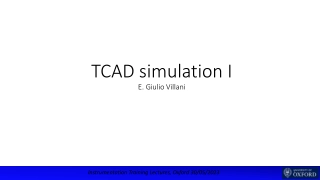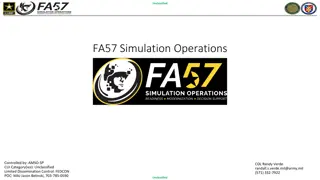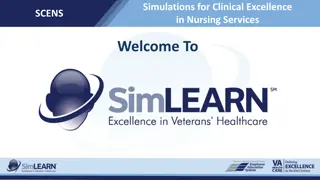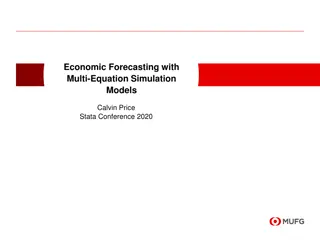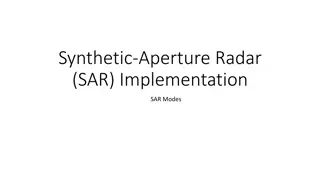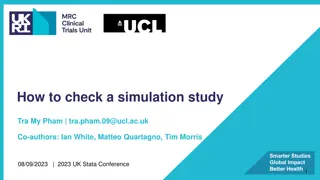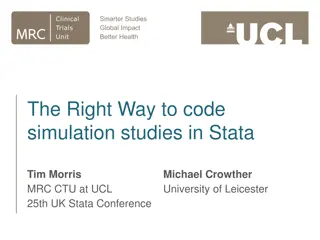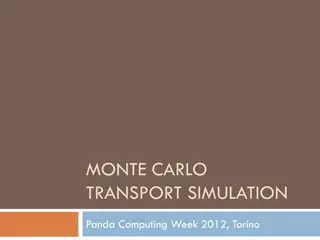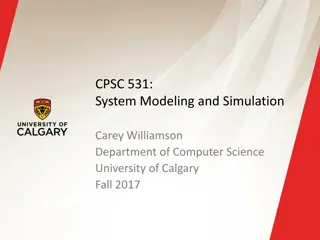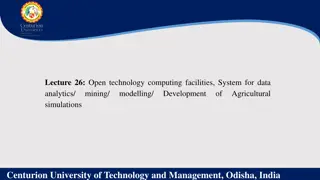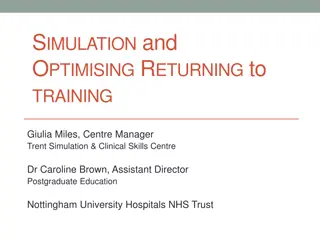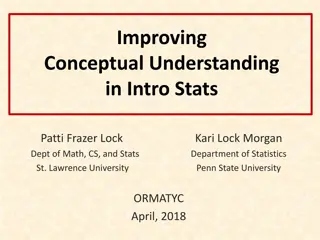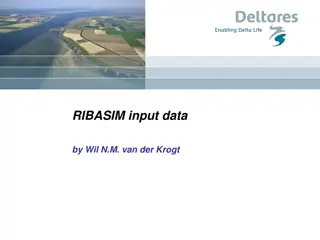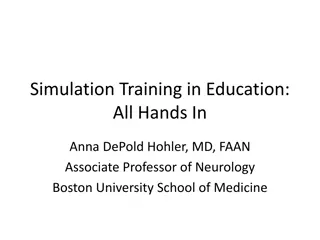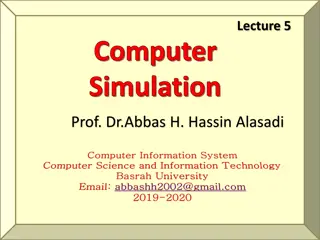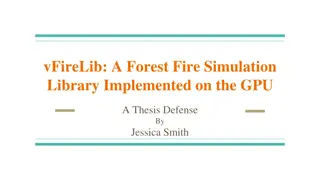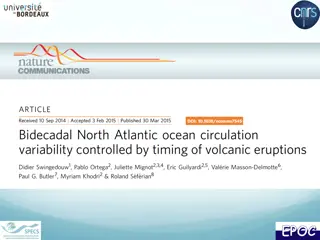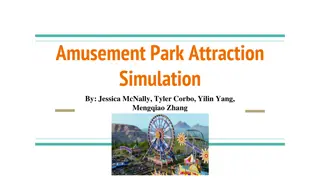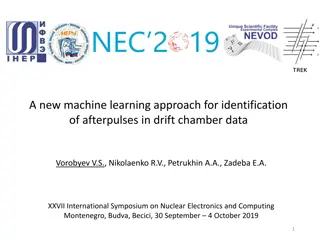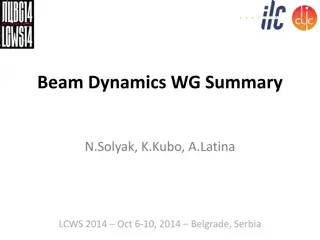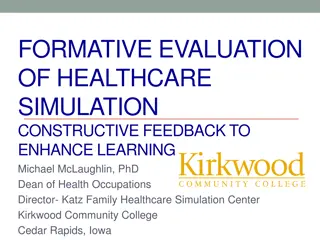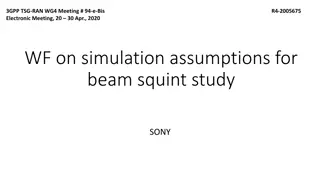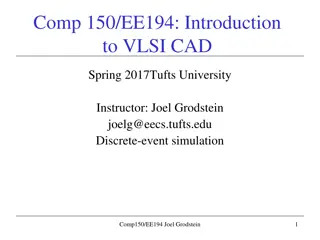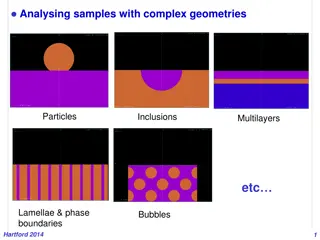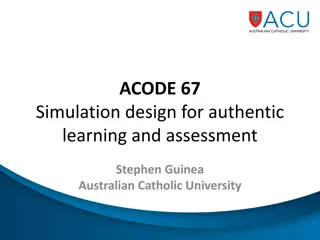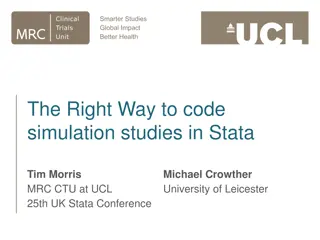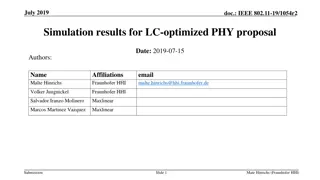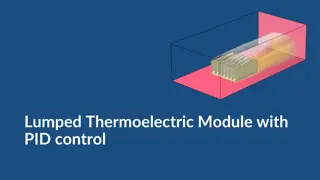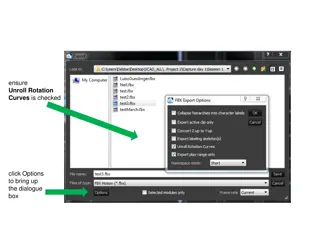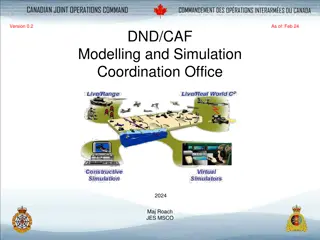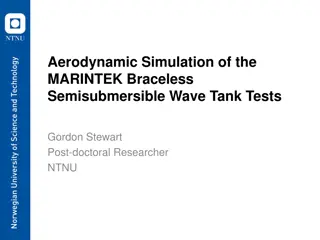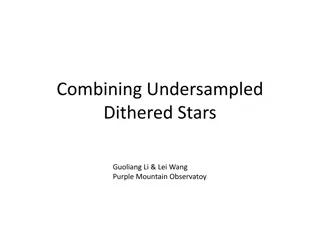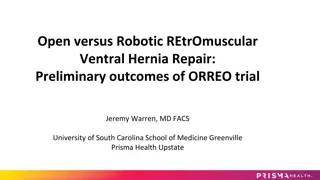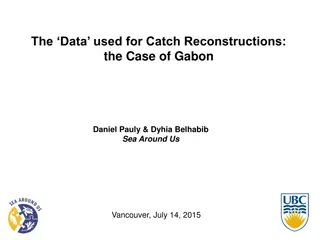TCAD simulation I
TCAD simulation plays a crucial role in the semiconductor industry, allowing for process and device simulations to meet market demands and reduce development time and costs. This involves modeling transport regimes, semiconductor equations, and electromagnetic fields to drive charge flow self-consis
1 views • 29 slides
System Modeling and Simulation Course Overview
This course covers the basics of systems modeling, discrete-event simulation, and computer systems performance evaluation. Topics include Monte Carlo simulation, probability models, simulation output analysis, queueing theory, and more. Professor Carey Williamson leads the course with a focus on pra
4 views • 21 slides
Overview of Army Modeling and Simulation Office
The U.S. Army Modeling and Simulation Office (AMSO) serves as the lead activity in developing strategy and policy for the Army Modeling and Simulation Enterprise. It focuses on effective governance, resource management, coordination across various community areas, and training the Army Analysis, Mod
1 views • 8 slides
Simulation-Based Training for Diabetes Care in Nursing
This simulation program, SCENS, focuses on enhancing nursing skills in managing diabetes-related complications such as hyper/hypoglycemia. The learning objectives include assessment, safe care provision, insulin administration, and effective communication. The simulation addresses the significant im
0 views • 17 slides
Understanding Economic Forecasting with Simulation Models
Explore the concept of economic forecasting using multi-equation simulation models, focusing on producing data that follows estimated equations rather than estimating model parameters. Learn about endogenous and exogenous variables, the importance of assumptions in forecasting, and the use of simula
0 views • 38 slides
Introduction to Forensic Psychology and its Intersection with Law
Forensic psychology and psychiatry involve applying psychological principles to legal matters, including competency evaluations and crime scene reconstruction. Forensic psychiatrists, with medical training, assess suspects, victims, and witnesses, while forensic psychologists, with expertise in psyc
0 views • 8 slides
Understanding Synthetic Aperture Radar (SAR) Modes and Implementations
Explore the world of Synthetic Aperture Radar (SAR) through various modes and implementations, covering topics such as SAR coordinate systems, pulse compression, range-Doppler algorithms, Born approximation, SAR scene simulation, and more. Dive into the distinctions between unfocused SAR and focused
0 views • 18 slides
How to Check a Simulation Study: Methods and Considerations
Simulation studies are often used to evaluate statistical methods and study power, but they can sometimes produce misleading results. This work discusses strategies to assess and improve the quality of simulation studies, drawing on experiences and considerations outlined in relevant literature. A s
0 views • 31 slides
Coding Simulation Studies in Stata: A Practical Approach
Understanding simulation studies and their importance in evaluating statistical methods, this presentation delves into the precise coding techniques required in Stata to generate simulated datasets, produce estimates, and analyze performance metrics. With a focus on consistent terminology, data-gene
5 views • 18 slides
Understanding Monte Carlo Transport Simulation
Monte Carlo simulation is a stochastic technique that uses random numbers and probability statistics to investigate and solve problems. In the context of transport simulation, a Monte Carlo program simulates the passage of particles through matter, involving geometry, transport, visualization, detec
0 views • 11 slides
System Modeling and Simulation Overview
This content provides insights into CPSC 531: System Modeling and Simulation course, covering topics such as performance evaluation, simulation modeling, and terminology in system modeling. It emphasizes the importance of developing simulation programs, advantages of simulation, and key concepts lik
0 views • 28 slides
Developing Agricultural Simulation System Using Data Mining Techniques
Development of an agricultural simulation system involves identifying data sources, collecting and integrating data, preprocessing, applying data mining techniques, developing simulation models, calibration, validation, and optimization for performance. User interface development and deployment are
0 views • 4 slides
Enhancing Training Through Simulation Techniques and Optimizing Performance
Simulation techniques play a crucial role in training programs, offering guided experiences that replicate real-world scenarios. By understanding learners' needs, fostering a safe environment, and facilitating debrief sessions, organizations can enhance clinical and procedural skills, teamwork, and
0 views • 12 slides
Enhancing Introductory Statistics through Simulation Methods
Explore innovative ways to improve the Introductory Statistics course by enhancing student understanding, success rates, and faculty enjoyment. Discover how simulation methods can reduce prerequisites, increase student engagement, and improve learning outcomes through hands-on workshops and keynote
1 views • 30 slides
Basin Manipulation Simulation Analysis Tool Overview
Basin Manipulation Simulation Analysis Tool provides a comprehensive solution for managing and analyzing basin data, including tasks like basin manipulation, simulation analysis, case management, and defining simulation time steps. The tool allows for easy data entry, visualization of simulation res
2 views • 17 slides
Simulation Training in Education: Enhancing Learning Through Hands-On Simulation
Hands-on simulation training in education provides students with valuable learning experiences by increasing self-reported knowledge and technical proficiency. Simulations help improve students' knowledge, experience, and comfort with challenging procedures in a lower-risk environment, leading to en
0 views • 13 slides
Understanding Computer Simulation and Modeling Tools
Computer simulation and modeling is essential for conducting studies in various fields. Selecting the right simulation language or package is crucial for accurate results. This involves considering the characteristics of the language, such as random number generation, process transformers, list proc
0 views • 7 slides
Insights into Summer 2017 Climate Variations and Heatwave Events
Climate research using climate reconstructions and model simulations for summer 2017, focusing on heatwave periods and temperature anomalies. Observations from instrumented sites and atmospheric soundings were utilized to analyze air temperature, soil moisture, and radiation. The study highlights th
0 views • 22 slides
vFireLib: Forest Fire Simulation Library on GPU
Dive into Jessica Smith's thesis defense on vFireLib, a forest fire simulation library implemented on the GPU. The research focuses on real-time GPU-based wildfire simulation for effective and safe wildfire suppression efforts, aiming to reduce costs and mitigate loss of habitat, property, and life.
0 views • 95 slides
Understanding Atlantic Overturning Observed and Simulated Variability
Exploring the initiation of the Atlantic overturning using observations and simulation reconstructions with models. Analysis of historical agreement, synchronisation, and control simulations. Investigation of a 20-year cycle in sea ice cover, feedback mechanisms, and the impact of events like the Mt
0 views • 32 slides
Amusement Park Attraction Simulation Project Overview
This project focuses on optimizing an amusement park attraction through simulation modeling using Simio. Objectives include adjusting system parameters to enhance ride efficiency, improve customer throughput, and maximize utilization of the presentation room. Key performance measures center around m
0 views • 20 slides
Machine Learning Approach for Afterpulse Identification in Drift Chamber Data
A new machine learning approach is introduced for the identification of afterpulses in drift chamber data, aiming to exclude afterpulses using convolutional neural networks. The research involves the reconstruction of tracks using the histogram method, addressing the issue of afterpulses that can le
0 views • 13 slides
Advanced Beam Dynamics and Machine Protection in High-Energy Linacs
Overview of recent talks and discussions at LCWS 2014 in Belgrade, Serbia, focusing on machine protection, simulation codes, instrumentation, and system tests. Topics include beam-loss monitors, dark current measurements, simulation code developments, and beam dynamics studies in linacs. Key speaker
0 views • 12 slides
Enhancing Healthcare Simulation Through Constructive Feedback
Explore the principles and benefits of healthcare simulation, focusing on formative evaluation and constructive feedback to improve learning outcomes. Delve into the role of formative assessment tools, TeamSTEPPS model, and Mayo High Performance Teamwork Scale in simulation scenarios. Discover the s
0 views • 37 slides
Simulation Assumptions and Performance Degradation Study on Beam Squint in 3GPP Meeting
Background on beam squint in conducted power of transmitted CCs causing radiative domain impairment and gain droop, with a problem statement on degradation of CC2 spherical coverage when CC1 and CC2 are separated by frequency. The study involves refined simulation assumptions to quantify radiative d
0 views • 7 slides
Beam Polarization Simulation Study for CEPC
Simulation study on beam polarization for the Circular Electron Positron Collider (CEPC) using the PTC Poly- morphic Tracking Code. The study includes orbital and spin tracking, equilibrium polarization calculation, and Monte-Carlo simulation of depolarization rate. Comparison with other Monte-Carlo
0 views • 20 slides
Introduction to VLSI CAD and Discrete-Event Simulation at Tufts University
This course introduces students to event-oriented simulation, building virtual models, and validating designs through simulation. It covers the importance of simulation in testing and refining designs before implementation. Examples include simulating VLSI networks and exploring the use of discrete-
0 views • 32 slides
Shower Reconstructions and Energy Analysis: Understanding Shower Behavior
Investigate shower behavior through reconstructed simulations to understand the differences between "dusj" and standard showers. Analyze energy ratios, z-direction differences, and event clusters to conclude that showers tend to underestimate energies compared to dusj, with insights into reconstruct
0 views • 10 slides
Advanced Simulation Techniques for Analyzing Samples with Complex Geometries
Explore the capabilities of PENELOPE simulation software for analyzing samples with intricate structures like particles, inclusions, multilayers, lamellae, and phase boundaries. The software facilitates detailed investigations of material composition and electron-photon transport in diverse geometri
0 views • 28 slides
Simulation Design for Authentic Learning and Assessment at ACU
Simulation design for authentic learning and assessment is a crucial aspect of education, particularly in the healthcare field. At the Australian Catholic University (ACU), simulation plays a significant role in providing students with authentic experiences that bridge the gap between theory and pra
0 views • 18 slides
The Right Way to Code Simulation Studies in Stata
Simulation studies in Stata involve using (pseudo) random numbers to generate data from a distribution for studying statistical methods. This process helps to evaluate different scenarios and understand the properties of statistical techniques. Key components like ADEMP (Aims, Data-generating mechan
0 views • 18 slides
Simulation Results for LC-Optimized PHY Proposal in July 2019
The document presents simulation results for an LC-optimized PHY proposal for TGbb based on G.9991 PHY. It includes details on the simulation setup, frame detection results, header modulation, coding simulation results, payload modulation, and coding simulation results. The setup involved various re
0 views • 18 slides
Thermoelectric Module with PID Control Simulation
This simulation showcases a lumped thermoelectric module with PID control. The model evaluates the performance of a thermoelectric element in a nonisothermal fluid flow around a heat sink. A stationary simulation assesses the module's capabilities, followed by a transient simulation with a PID contr
0 views • 7 slides
Camera Calibration and Post-Processing Guide
Enhance your camera calibration and post-processing skills with this comprehensive guide. Ensure proper settings and follow step-by-step instructions for accurate results. From unrolling rotation curves to solving motion, this guide covers it all. Utilize tools like auto masking, wand wave data coll
0 views • 15 slides
Defense Modeling and Simulation Coordination Office Overview
The Defense Modeling and Simulation Coordination Office (DND/CAF MSCO) is responsible for managing contractors, policies, and strategic activities related to modeling and simulation within the Canadian Armed Forces. The office focuses on supporting various organizations and enhancing capabilities th
0 views • 6 slides
Aerodynamic Simulation of MARINTEK Braceless Semisubmersible: Insights and Tools
Explore the aerodynamic simulation of the MARINTEK Braceless Semisubmersible through advanced techniques and tools. Discover the unique aerodynamic actuator, simulation models, and tools used in the research conducted by Gordon Stewart, a post-doctoral researcher at NTNU. Gain insights into the expe
0 views • 16 slides
Advanced Image Processing Techniques for High-Quality Reconstruction
Cutting-edge methods in astrophotography, such as deconvolution and pixel convolution effects, are explored in this detailed presentation. These techniques offer superior image restoration compared to traditional algorithms, emphasizing the importance of addressing pixelation effects to achieve high
0 views • 9 slides
Comparative Outcomes of Open Versus Robotic Ventral Hernia Repair
This study compares the outcomes of open versus robotic retro-muscular ventral hernia repair, focusing on minimally invasive approaches and their impact on clinical results. Preliminary findings reveal differences in surgical site infections, length of hospital stays, and other complications between
0 views • 15 slides
Understanding Simulation Types for Ecosystem Modeling
Exploring different simulation types such as continuous and discrete event simulations for modeling complex systems like ecosystems. Detailed discussion on creating an ecosystem simulation with fish and bears on a grid, showcasing actions like breeding, moving, eating, and dying. Overview of a World
0 views • 31 slides
Catch Reconstruction in Gabon: Addressing Misleading Questions
Exploring catch reconstructions in Gabon, this study by Daniel Pauly and Dyhia Belhabib highlights the importance of accurate data. Nature's question becomes a starting point for discussing the complexities of fisheries management and sustainability.
0 views • 157 slides
